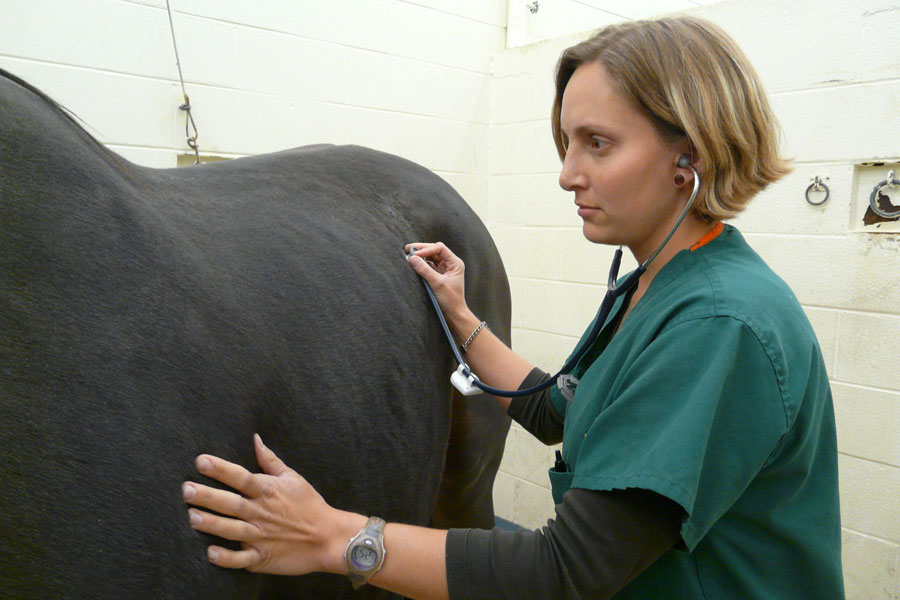Veterinary Technicians indispensible part of clinical care in veterinary college

Since the Virginia-Maryland Regional College of Veterinary Medicine's Veterinary Teaching Hospital opened its doors, technicians have been working alongside veterinarians to provide the highest quality for hospital patients.
While the facilities, equipment, and personnel may have changed over the past 28 years, one thing remains the same: the critical role technicians play on the clinical healthcare team and their extraordinary dedication to duty.
“Technicians are indispensable members of our healthcare team,” said Dr. Bill Pierson, director of the veterinary college’s teaching hospital at Virginia Tech.
Veterinary technicians are the nurses of the veterinary profession. Working under the supervision of a veterinarian, they provide specialized care and can assist in a variety of diagnostic, medical, and surgical procedures for both small and large animals. Licensed veterinary technicians, or LVTs, are veterinary technicians who have completed at least two years of academic study resulting in an associate’s degree and have passed a state examination.
According to Rick Hiller, administrator of the teaching hospital, the veterinary college currently employees 34 licensed veterinary technicians.
According to the National Association of Veterinary Technicians in America, there are currently over 100 veterinary technology programs in the United States that educate veterinary technicians. In order to maintain a standard of excellence, these programs are accredited by the American Veterinary Medical Association just like colleges of veterinary medicine. While being licensed is only required for the intensive care unit and anesthesiology, the majority of the technicians in the Veterinary Teaching Hospital are LVTs, and of those who aren’t, most are working to attain LVT status.
Technicians are now starting to seek specialty certification in a variety of fields including emergency and critical care, medicine, dentistry, and anesthesiology. This recognition requires additional education, experience, and examination. Ami Gilkey, who has been with college eight years, obtained her specialty certificate in anesthesiology. She is now working on a chapter in a textbook that will aid others in this pursuit.
“I enjoy learning and bettering myself and I love my job,” said Gilkey when asked why she chose to seek her specialty certification. “I want to always provide our patients with the best care possible.”
In addition to hands-on care for the patient, veterinary technicians also assist in teaching fourth-year students during the time they spend in the teaching hospital.
For many, the variety of their work is what they enjoy so much.
“We not only get be involved in patient care, but we get to teach others how to provide the highest quality of care,” said Deanna McCrudden, who has been with the college for 19 years and currently serves as the supervisor for small animal technicians. “The students are a large part of why we love what we do.”
For others, the love of their patients and the desire to continually enhance the standard of care is what drives them forward.
“We deeply care about all of our animals,” said Becky Wade, the large animal staff supervisor who has been with the college since 1981. “It doesn’t matter if they are the ugliest or the smelliest; there is no limit to how far we will go to make sure they are well taken care of.”
An event that occurred in the earliest years of the college provides a good example of the kind of dedication veterinary technicians bring to the hospital. Wade recalls sleeping all night on a mat outside the stall of an equine patient in order to monitor his condition. A horse named Woody Creek had been admitted with a fracture. He had to be supported by a hoist which was installed in a matter of hours to accommodate his injury and is still used today. At the time, the Veterinary Teaching Hospital did not yet have an overnight technician, so Wade volunteered to be the night nurse.
Wade said she wouldn’t have had it any other way, adding that the sling still hangs in the large animal hospital as a reminder of the case. “Every new case is a new door opened and a new solution found,” she said.
The dedication of Wade, McCrudden, and others does not go unnoticed. They were recently recognized by the hospital during National Veterinary Technician Week Oct.12-18.
“These individuals are just good people in every aspect,” said Pierson. “By doing their jobs extraordinarily well, they enable our veterinarians to offer the highest quality of care possible.”




.jpg.transform/m-medium/image.jpg)